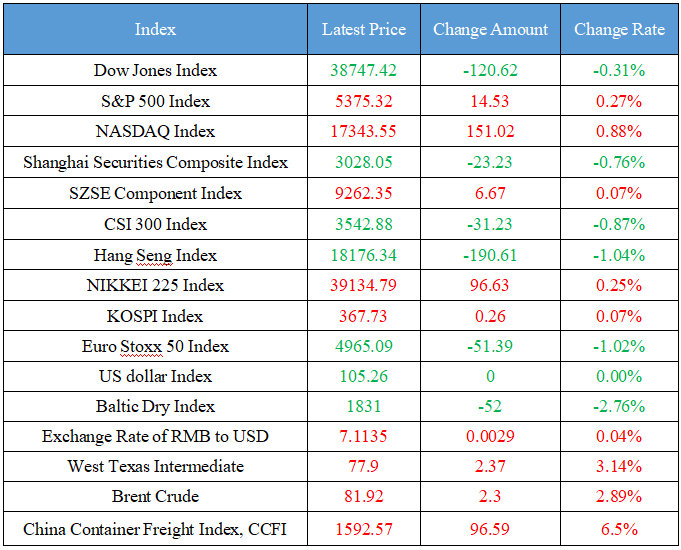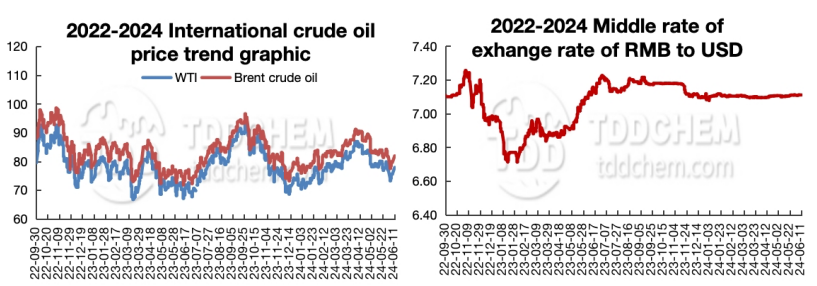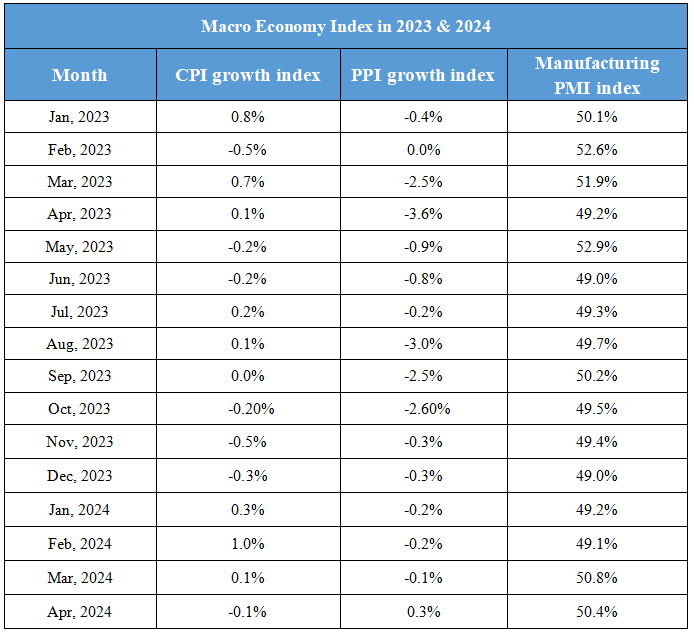June 13th Macroeconomic Index: Global Economic Growth Stabilizes, BRICS Dialogue Advances Multipolarization
Latest Global Major Index

International Crude Price Trend and Exchange Rate of RMB to USD Trend

Domestic News
1. State Grid: Promote the acceleration of the construction of regulated power supply and strengthen cross-regional and cross-provincial coordination and mutual assistance
2. A dialogue of foreign ministers was hold of BRICS countries and developing countries
3. Xi Jinping: Promote enterprises to establish and improve a modern enterprise system with clear property rights, clear rights and responsibilities, separation of government and enterprises, and scientific management
4. Tian Shihong attended the 124th Council Meeting of the International Organization for Standardization (ISO)
5. The power supply guarantee in the peak summer in many places has been launched, and Shenzhen Power Grid has completed and put 9 substations into operation this year
International News
1. World Bank: Global economic growth has stabilized, but it is well below pre-pandemic levels
2. The EU intends to postpone the implementation of key bank capital requirements to ensure the competitiveness of banks
3. OPEC monthly report: The world's major central banks will turn to more accommodative policies in the second half of the year
4. U.S. data: Small business confidence rose in May, but the proximity of the election cast a shadow over the outlook
5. BNP Paribas: The core CPI in the United States is expected to remain at 0.3% in May
Domestic News
1. State Grid: Promote the acceleration of the construction of regulated power supply and strengthen cross-regional and cross-provincial coordination and mutual assistance
Zhang Zhigang, chairman of the company, said that based on the company's responsibilities and missions, we should resolutely implement the decisions and arrangements of the Party Central Committee and the State Council, and contribute to the rise of the central region in the new era. First, we must shoulder the primary responsibility of ensuring power supply. Promote the acceleration of the construction of regulated power supply, strengthen cross-regional and cross-provincial coordination and mutual assistance, fully tap the potential of various adjustable resources, strengthen the bottom line of people's livelihood electricity, and resolutely win the battle of ensuring power supply in the peak summer. Second, we must promote the high-quality development of the power grid. We will improve power grid planning on a rolling basis, accelerate the construction of key projects, promote the coordinated development of power grids at all levels, serve the integrated development of urban and rural areas and the comprehensive revitalization of rural areas, serve the high-quality development of new energy, and help build a beautiful central region. Third, we must strengthen scientific and technological innovation for the construction of new power systems. Make good use of the advantages of the central region in the agglomeration of scientific and educational resources, give full play to the role of various innovative entities, increase investment in scientific research elements, strengthen collaborative innovation and technological research, and promote the accelerated development of new quality productive forces. (State Grid official WeChat)
2. A dialogue of foreign ministers was hold of BRICS countries and developing countries
On June 11, 2024 local time, Wang Yi, member of the Political Bureau of the CPC Central Committee and Minister of Foreign Affairs, attended the BRICS Foreign Ministers' Dialogue with Developing Countries in Nizhny Novgorod ("BRICS+"). Wang Yi said that BRICS+ is an important dialogue platform for BRICS countries to face the vast number of emerging markets and developing countries, and the collective rise of emerging markets and developing countries has greatly promoted the process of world multipolarization. A new round of scientific and technological revolution and industrial transformation is in the ascendant, and a large number of countries are on the fast track of development. The "Global South" is no longer the silent majority, but an awakened new force. Wang Yi put forward three views on developing countries opening up a new situation in the midst of changes and nurturing new opportunities in the midst of crises. First, we need to uphold universal security and work together to address challenges. Second, adhere to the priority of development and gather the synergy of progress; Third, we need to uphold fairness and justice and improve global governance. (Ministry of Foreign Affairs)
3. Xi Jinping: Promote enterprises to establish and improve a modern enterprise system with clear property rights, clear rights and responsibilities, separation of government and enterprises, and scientific management
Xi Jinping presided over the fifth meeting of the Central Committee for Comprehensively Deepening Reform, emphasizing the need to improve the modern enterprise system with Chinese characteristics, promote enterprises to establish and improve a modern enterprise system with clear property rights, clear rights and responsibilities, separation of government and enterprises, and scientific management, and cultivate more world-class enterprises. To stabilize grain production and ensure food security, it is necessary to protect and mobilize the enthusiasm of farmers in growing grain and local grain grabbing, improve the mechanism for guaranteeing the income of grain farmers and the mechanism for compensating the interests of major grain-producing areas, improve the accuracy and effectiveness of policies, and consolidate the foundation of food security. It is necessary to adhere to the principle of promoting innovation through openness, improve the system and mechanism of opening up science and technology to the outside world, improve the innovation system for the world, actively integrate into the global innovation network, highlight key areas and key links, and make up for the shortcomings of the open innovation system.
4. Tian Shihong attended the 124th Council Meeting of the International Organization for Standardization (ISO)
The 124th Council Meeting of the International Organization for Standardization (ISO) was held in Copenhagen, Denmark, from June 3 to 6. Tian Shihong, deputy director of the State Administration for Market Regulation and director of the National Standards Committee, led a delegation to attend the meeting as the chairman of the ISO China national member body and the representative of the permanent member states. During the meeting, a seminar was also held on the theme of strengthening the interaction between the ISO Council and the Technical Administration, and Tian Shihong was deeply involved in the discussion of the meeting and put forward China's opinions and suggestions, which were recognized by the ISO Secretary-General and the participants. (State Administration for Market Regulation)
5. The power supply guarantee in the peak summer in many places has been launched, and Shenzhen Power Grid has completed and put 9 substations into operation this year
The high temperature process lasted for a long time and had a large impact range, and many places launched specific measures to ensure energy supply during the peak summer. In the southern region, Shenzhen's power grid has supplied more than 40 billion kilowatt hours this year, a year-on-year increase of more than 10%. In order to cope with the early arrival of the summer electricity peak, Shenzhen Power Grid has completed and put into operation 9 substations this year, with an additional capacity of 2.6 million kVA, which is 140% of the same period last year. (CCTV Finance)
International News
1. World Bank: Global economic growth has stabilized, but it is well below pre-pandemic levels
The World Bank said on Tuesday that the U.S. economy performed better than expected, prompting it to slightly raise its forecast for global economic growth in 2024, but warned that overall output would remain well below pre-pandemic levels by 2026. The World Bank said in its latest Global Economic Prospects report that the global economy will avoid a third consecutive decline in real GDP growth since the sharp post-pandemic growth in 2021, and growth will stabilize at 2.6% in 2024, the same as in 2023. This is 0.2 percentage points higher than the World Bank's January forecast. "In a sense, we see a runway for a soft landing," said Ayhan Kose, deputy chief economist at the World Bank. He noted that aggressive interest rate hikes in the U.S. or other major economies have brought inflation down, but there has been no massive unemployment and other disruptions. "That's good news. The not-so-good news is that we could be stuck in the slow lane," Kose said.
2. The EU intends to postpone the implementation of key bank capital requirements to ensure the competitiveness of banks
The EU will delay the implementation of key parts of the global bank capital rules by a year to avoid putting EU banks at a disadvantage due to the ongoing debate over US standards, people familiar with the matter said. The EU has not yet made a formal decision on the partial postponement, but a decision could be made in the coming weeks or announced this summer, according to people familiar with the matter. The EU was scheduled to begin implementing a broader package on January 1 next year. In recent months, the EU has come under increasing pressure to finalize Basel III, with leaders, including French President Emmanuel Macron, arguing that European action would put their banks at a disadvantage. The CEO of Deutsche Bank also called on the European Commission to act, citing "fierce" international competition from European banks. After the topic became a political hot topic, the United States has yet to agree on a broader package of measures, and it will not be implemented by the middle of next year at the earliest. The UK has set a launch date for mid-2025.
3. OPEC monthly report: The world's major central banks will turn to more accommodative policies in the second half of the year
The OPEC monthly report noted that the world's major central banks, especially the United States, the eurozone and the United Kingdom, are expected to shift to more accommodative monetary policy in the second half of the year, which will depend on the growth dynamics and inflation development of individual economies. From a sectoral perspective, the improvement in industry in non-OECD economies is very clear, while industrial production in OECD economies is expected to pick up only gradually in the second half of the year from the weak levels seen since the beginning of the year. From a global perspective, the service industry has maintained a steady momentum of development. This factor is expected to be the main contributor to the economic growth momentum in the second half of the year, especially supported by tourism, which will have a positive impact on oil demand.
4. U.S. data: Small business confidence rose in May, but the proximity of the election cast a shadow over the outlook
U. S. small business confidence and hiring plans rose to their highest levels of the year in May, but the looming U.S. presidential election has also pushed uncertainty to a nearly four-year high. The National Federation of Independent Business (NFIB) said its Small Business Optimism Index rose 0.8 points to 90.5 last month, marking the second consecutive month of gains after falling to its lowest level since December 2012 in March. Despite the gains, this is the 29th consecutive month that the index has been below the 50-year average of 98 points. The NFIB uncertainty index rose 9 points to 85, the highest level since November 2020, the month of the last U.S. presidential election. Bill Dunkelberg, chief economist at NFIB, said, "Optimism among small business owners has been at an all-time low for 29 consecutive months, and their views on future business conditions are at their worst level in 50 years." "Inflation is once again at the top of the list of concerns for small business owners.
5. BNP Paribas: The core CPI in the United States is expected to remain at 0.3% in May
Andy Schneider, an analyst at BNP Paribas, said: "We expect US core CPI to rise by 0.3% m/m for the second consecutive month in May, further suggesting that inflation is coming down from consecutive highs in the first quarter. Housing inflation fell to its lowest level since December 2021 and is expected to weigh on headline levels, the company said in a note. If inflation is lower than expected, then this will pave the way for a rate cut by the end of the year, the company said.
Domestic Macro Economy Index














